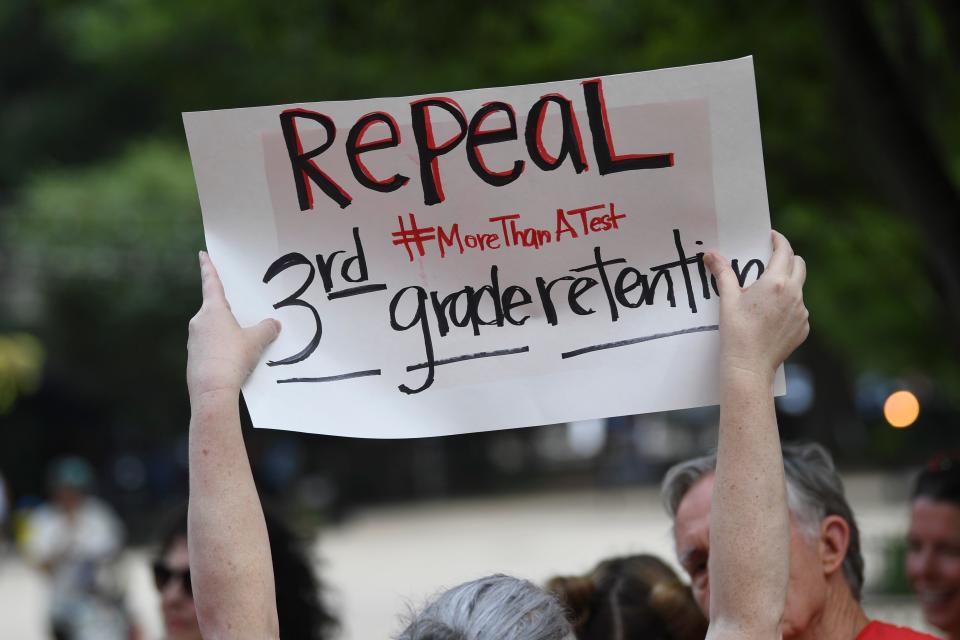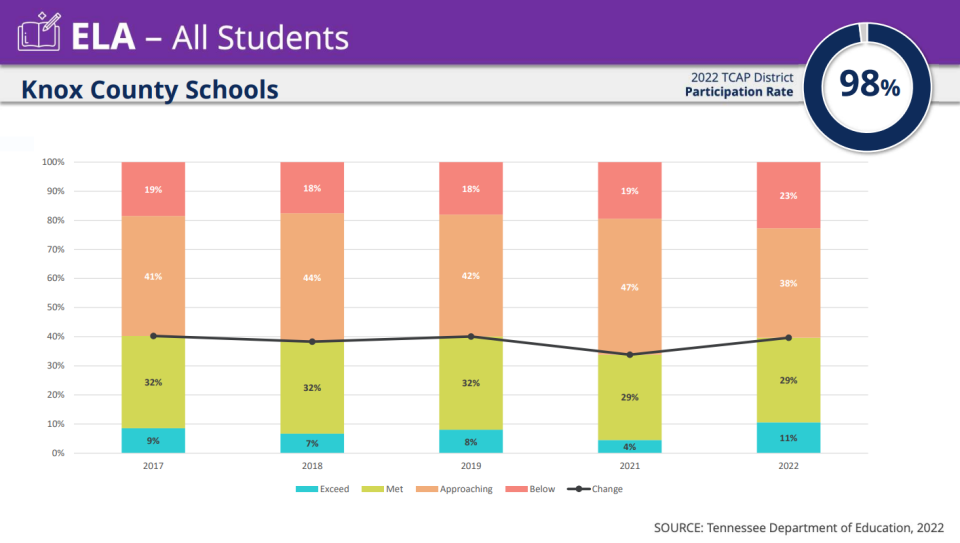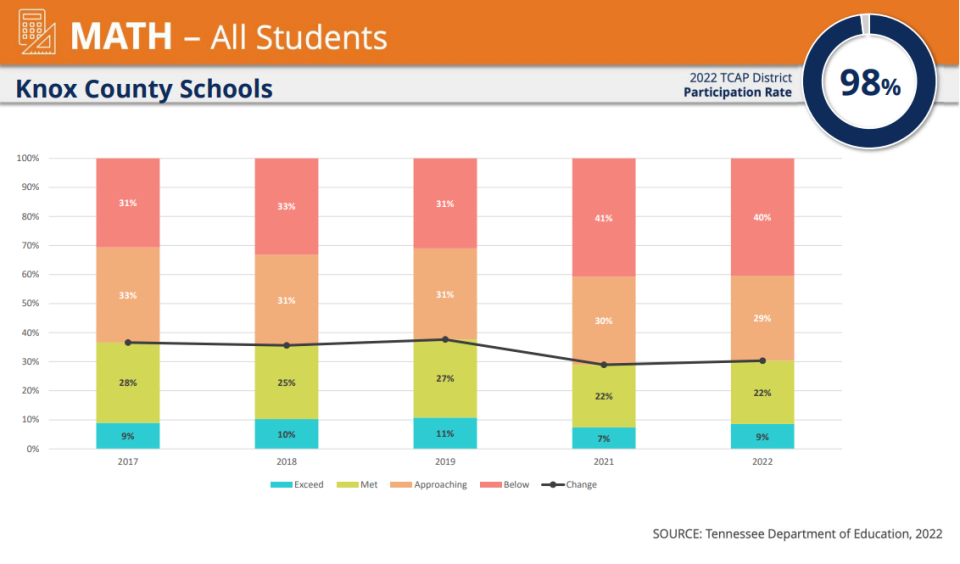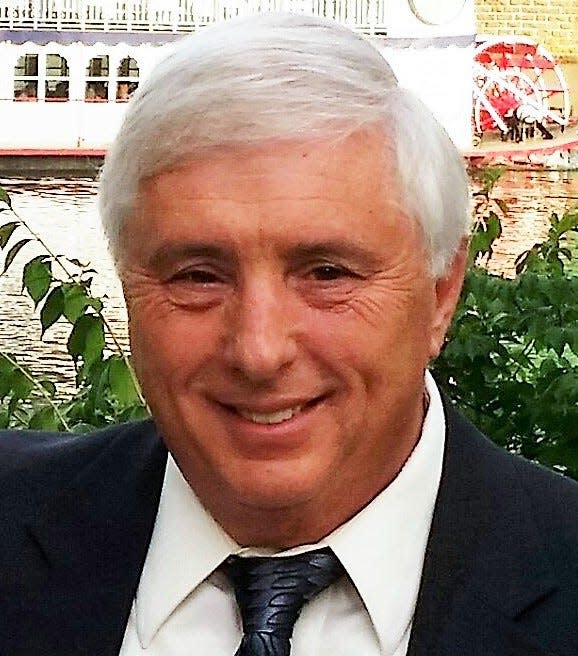Education isn’t the priority in public schools. Competing agendas are | George Korda
Education isn’t the societal, or even political, force it’s cracked up to be, and anyone who says differently is selling something. American education is instead captive to ever-mushrooming political, educational and societal agendas.
If learning were a priority, public education wouldn’t find itself with just 36% of Americans saying they’re satisfied with the system, tying a record low, according to Gallup. Education is frequently cited as the country’s most important issue because (pardon the cliché), children are our future. Candidates for public office are expected to present education platforms. Education frequently ranks high on lists of voter concerns.
Knox County's middling TCAP scores
However, based on dismal-for-decades analyses and assessments of American and Tennessee educational progress, all the talk, platforms and polls aren’t getting us much of anywhere. If that weren’t true, educational achievement wouldn’t be at the same mediocre levels at which it’s been for many years, and Knox County and the nation would be well beyond education’s continuing achievement doldrums.

For example, from the News Sentinel in July: “About 41% of Knox County students across all grades met or exceeded expectations in the reading portion of the annual TCAP [Tennessee Comprehensive Assessment Program] test compared to 38% statewide. In math, 33.8% Knox County students across all grades met or exceeded expectations, just above the statewide percentage at 33.7%.”
In the 21st century, the most technologically advanced time in human history, when the economy is undergoing transformative change, and when the challenges of the future demand educational excellence, the numbers above don’t shout success, but instead, look out below!
Excuses, excuses
The reasons or excuses are endless: too much testing, not the right testing or not enough testing; socioeconomic issues; not enough money put toward education; English as a second language obstacles; too much accountability placed on teachers; not enough accountability placed on teachers; too much discipline, not enough discipline, not the right discipline, etc., etc., etc. All come with agendas, and every agenda leads to an argument.

We repeatedly hear that the COVID-19 pandemic was, and is, responsible for a state and national learning deficit. Oh, really? Here are interesting statistics about Tennessee and national student reading achievement from the National Assessment of Educational Progress website. The NAEP is a program of the U.S. Department of Education; also, please note that the scores are based on a maximum of 500 points: “In 2022, the average score of fourth-grade students in Tennessee was 214. This was not significantly different from the average score of 216 for students in the nation. The average score for students in Tennessee in 2022 (214) was lower than the average score in 2019 (219) and was not significantly different from their average score in 1998 (212).”
If you think things improve as time passes, please think again. What follows is the 2022 assessment of Tennessee eighth-graders and includes a reference to national results: “In 2022, the average score of eighth-grade students in Tennessee was 258. This was not significantly different from the average score of 259 for students in the nation. The average score for students in Tennessee in 2022 (258) was lower than their average score in 2019 (262) and was not significantly different from their average score in 1998 (258).
If we’re not mistaken – and we’re not – in 1998, COVID-19 wasn’t even a twinkle in the eye of a bat in China or breaking loose from a laboratory test tube.
These days, when the public hears something about public schools, it’s perhaps more likely that rather than a meaningful examination of educational deficits, other subjects will take center stage, such as a student who was assigned male at birth but identifies as female wanting to use the girls’ locker room, or a Satan Club possibly forming at a Memphis-Shelby County Elementary School.

Students trading public schools for other options
As the cacophonous roar of nonacademic clashes occurs, enrollment in American public schools is dropping. In August 2022, some 2 million students were cited as abandoning public schools, their parents opting instead for charter schools, private schools or homeschooling, which is burgeoning. In such environments parents can probably not be concerned about the aforementioned nonacademic concerns.
Are students, particularly high school students, believing that their academic performance is irrelevant because the “government” will take care of their debts, health care, food, lodging and more? Are they succumbing to popular culture’s image of school as being useful only as a place to meet to plan weekend parties?
There’s the possibility that secondary-school courses are being watered down and grading made more lenient to show higher grade-point average achievement, to reduce criticism of teachers and administrations, to dispel complaints about “inequity” or all three. Changing the standards doesn’t change reality — but the attempt is underway. From Community College Review: “According to Michigan’s Detroit Free Press, experts estimate that about 20% of students at four-year colleges and universities across the nation need remedial coursework of some kind. But at community colleges, it has been estimated that 60% of first-time students need at least one remedial course.”
Why? Because they arrive unable to do college-level work because of reading, math, or other deficiencies. But a movement is underway nationally to encourage students to refuse remedial courses, which will do nothing to improve student proficiency. Eventually, standards will have to be lowered to accommodate underperforming, or under-taught, students.
The solution is hard to find. There are endless studies with endless complex graphs and charts that contain endless suggestions for how to improve the endlessly perplexing and societally damaging issue of students who can’t perform at a 21st-century level. And behind each are phalanxes of experts, associations and interest groups that, for their own reasons or agendas, demand that their ideas be the ones adopted.
If education were truly a priority, a 30-40% reading and math grade equivalency rate wouldn’t be acceptable to taxpayers who pay public education’s bills. Parents wouldn’t stand for it. They would be involved actively in helping their children read. School system administrators and school boards would be rightfully embarrassed and be held accountable. Teachers would be properly supported, and alibis for poor performance wouldn’t be acceptable. Legislators would focus on supporting student achievement, to the exclusion of their individual or party agendas, and be held accountable. In every school system, high standards would be set, and students expected to achieve them, without exploring innumerable ways they shouldn’t be responsible or held accountable for their own learning.

If education were truly the priority, adults wouldn’t be fighting over a multiplicity of competing theories, policies and goals, all demanding attention, authority – and, of course, money.
But they are, and American public education is stuck on the rocks of competing agendas. And everyone is losing.
George Korda is a political analyst for WATE-TV, hosts “State Your Case” from noon to 2 p.m. Sundays on WOKI-FM Newstalk 98.7 and is president of Korda Communications, a public relations and communications consulting firm.
This article originally appeared on Knoxville News Sentinel: George Korda: Agendas, not education, are priority in public schools

